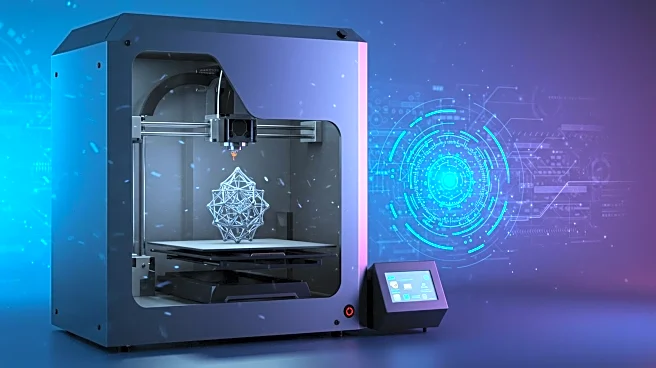What's Happening?
Rapid Fusion, a technology specialist based in the South-West, has launched an AI 'print assistant' designed to optimize its robotic additive manufacturing systems. The assistant, named 'Bob (Base of Build)', aims to improve the performance of 3D printing for sectors such as automotive, aerospace, construction, medical, and military. After eight months of development, the AI system is being rolled out to existing clients, promising enhanced operator control and reduced downtime through preventative maintenance. The assistant operates in both online and offline configurations, catering to military and IP-sensitive clients. It integrates with Rapid Fusion's existing models, including Apollo, Zeus, and Medusa, the latter being the first UK-built large format hybrid 3D gantry printer.
Why It's Important?
The introduction of AI in 3D printing by Rapid Fusion represents a significant advancement in manufacturing technology. By reducing machine downtime and increasing efficiency, the AI assistant can potentially lower production costs and improve output quality. This development is crucial for industries relying on complex component manufacturing, such as aerospace and automotive, where precision and reliability are paramount. The AI's ability to handle extensive material variants and optimize configurations based on specific requirements could lead to broader adoption of 3D printing technologies across various sectors, enhancing innovation and competitiveness.
What's Next?
Rapid Fusion plans to offer two levels of user access to the AI assistant. A super user level will be available to trusted partners and universities, allowing them to contribute to the system's development. A standard offer will be released in early 2026 for all users of the company's systems, with upgrades delivered remotely to continually enhance customer support. This rollout marks the beginning of a new era in smart 3D printing, with ongoing improvements expected as more users adopt the technology.
Beyond the Headlines
The AI print assistant's ability to operate in secure offline configurations highlights its potential for use in sensitive environments, such as military applications. This feature ensures that proprietary information and intellectual property are protected, addressing security concerns in high-stakes industries. Additionally, the assistant's comprehensive knowledge base and user-friendly interface could democratize access to advanced 3D printing technologies, making them more accessible to a wider range of users.








